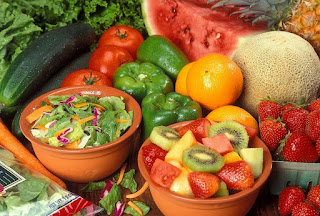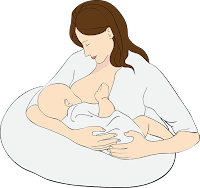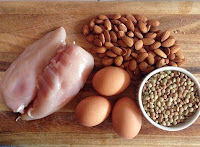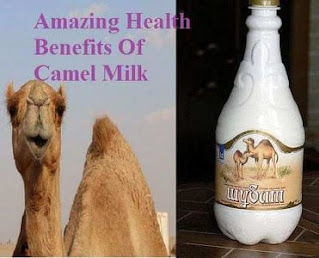Breastfeeding moms need to keep their energy up with nutritious foods,
especially immediately after giving birth. Your body goes through massive physical and hormonal changes right after delivery and then must start producing milk for your baby. Foods high in protein, whole grains, iron, calcium and omega-3 fatty acids should all be part of your postpartum diet as a nursing mom.
You need three to four 3-ounce servings of protein per day plus four to five servings of dairy to meet your protein requirements. Dairy also helps meet your increased calcium needs. Lean meats, poultry, pork, fish, eggs, dairy products, nuts, seeds and legumes supply the most protein in your diet. If you follow a vegan diet, check your levels of vitamin B-12, a nutrient found mostly in meat. B-12 deficiency could cause weakness, appetite loss, vomiting or slow development in your baby, WomensHealth.gov warns. Breastfeeding vegans should discuss B-12 supplementation with their doctors.
 Vegetables and fruits also supply healthy carbohydrates that provide energy to your postpartum diet, as well as vitamins and minerals you and your nursing baby need fiber, which helps prevent constipation, a common complaint right after delivery, especially if you had a Cesarean section and are taking narcotics for pain. Include three to five 1/2-cup cooked or 1-cup raw servings of vegetables and two to four 1/2-cup fruit servings daily. Wash fruits and vegetables thoroughly to remove pesticides. The top 10 most-contaminated produce includes apples, celery, strawberries, peaches, spinach, imported nectarines and grapes, bell peppers, potatoes and domestic blueberries, according to the Environmental Working Group. Fruits and vegetables with the least pesticide residue include onions, sweet corn, pineapple, avocado, asparagus, sweet peas, mangoes, eggplant, domestic cantaloupe and kiwi.
Vegetables and fruits also supply healthy carbohydrates that provide energy to your postpartum diet, as well as vitamins and minerals you and your nursing baby need fiber, which helps prevent constipation, a common complaint right after delivery, especially if you had a Cesarean section and are taking narcotics for pain. Include three to five 1/2-cup cooked or 1-cup raw servings of vegetables and two to four 1/2-cup fruit servings daily. Wash fruits and vegetables thoroughly to remove pesticides. The top 10 most-contaminated produce includes apples, celery, strawberries, peaches, spinach, imported nectarines and grapes, bell peppers, potatoes and domestic blueberries, according to the Environmental Working Group. Fruits and vegetables with the least pesticide residue include onions, sweet corn, pineapple, avocado, asparagus, sweet peas, mangoes, eggplant, domestic cantaloupe and kiwi.
especially immediately after giving birth. Your body goes through massive physical and hormonal changes right after delivery and then must start producing milk for your baby. Foods high in protein, whole grains, iron, calcium and omega-3 fatty acids should all be part of your postpartum diet as a nursing mom.
Breastfeeding women should take these Foods in their diet.
Proteins
Breastfeeding moms need slightly more protein than non-nursing women, around 71 grams per day, according to the Ohio State University extension.You need three to four 3-ounce servings of protein per day plus four to five servings of dairy to meet your protein requirements. Dairy also helps meet your increased calcium needs. Lean meats, poultry, pork, fish, eggs, dairy products, nuts, seeds and legumes supply the most protein in your diet. If you follow a vegan diet, check your levels of vitamin B-12, a nutrient found mostly in meat. B-12 deficiency could cause weakness, appetite loss, vomiting or slow development in your baby, WomensHealth.gov warns. Breastfeeding vegans should discuss B-12 supplementation with their doctors.
Whole Grains
You need the energy to take care of your newborn as well as to produce milk. Carbohydrates give you the quickest source of energy. Don't go for simple sugars, which raise your glucose levels quickly but can drop them just as fast. A drop in blood sugar can make you feel weak, tired or depressed. Choose complex carbohydrates that absorb more slowly and stabilize your blood sugars. Whole grains such as oatmeal, quinoa, brown rice, barley and bulgur as well as whole wheat products give you energy without the excess calories found in simple sugars. Include nine to 11 servings of whole grain in your daily diet; one slice of bread or 1/2 cup of starch equals one serving.Fruits and Vegetable
 Vegetables and fruits also supply healthy carbohydrates that provide energy to your postpartum diet, as well as vitamins and minerals you and your nursing baby need fiber, which helps prevent constipation, a common complaint right after delivery, especially if you had a Cesarean section and are taking narcotics for pain. Include three to five 1/2-cup cooked or 1-cup raw servings of vegetables and two to four 1/2-cup fruit servings daily. Wash fruits and vegetables thoroughly to remove pesticides. The top 10 most-contaminated produce includes apples, celery, strawberries, peaches, spinach, imported nectarines and grapes, bell peppers, potatoes and domestic blueberries, according to the Environmental Working Group. Fruits and vegetables with the least pesticide residue include onions, sweet corn, pineapple, avocado, asparagus, sweet peas, mangoes, eggplant, domestic cantaloupe and kiwi.
Vegetables and fruits also supply healthy carbohydrates that provide energy to your postpartum diet, as well as vitamins and minerals you and your nursing baby need fiber, which helps prevent constipation, a common complaint right after delivery, especially if you had a Cesarean section and are taking narcotics for pain. Include three to five 1/2-cup cooked or 1-cup raw servings of vegetables and two to four 1/2-cup fruit servings daily. Wash fruits and vegetables thoroughly to remove pesticides. The top 10 most-contaminated produce includes apples, celery, strawberries, peaches, spinach, imported nectarines and grapes, bell peppers, potatoes and domestic blueberries, according to the Environmental Working Group. Fruits and vegetables with the least pesticide residue include onions, sweet corn, pineapple, avocado, asparagus, sweet peas, mangoes, eggplant, domestic cantaloupe and kiwi.








No comments:
Post a Comment